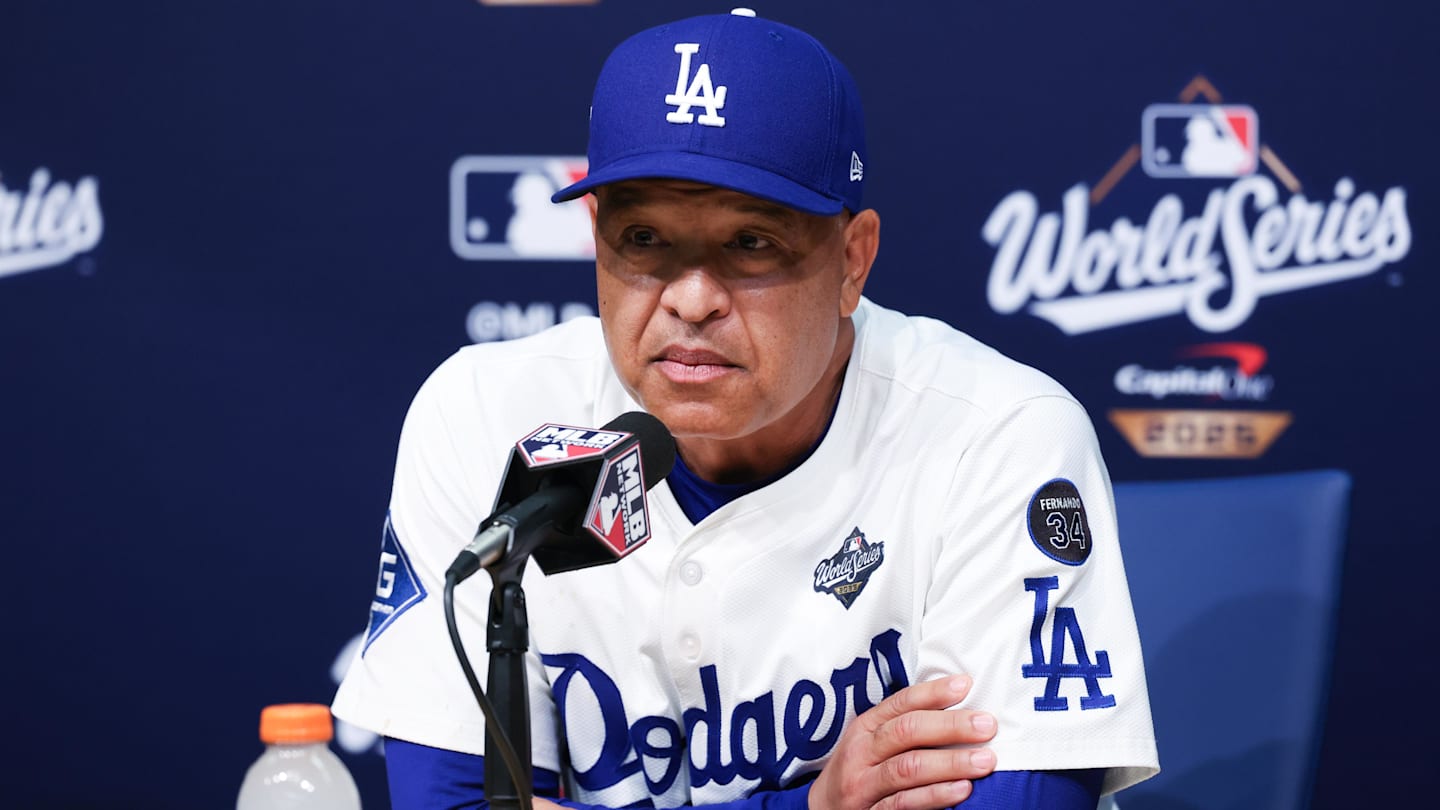LOS ANGELES — Sometimes, a Dodgers player will check the news and find his name in it, alongside his manager’s. Dave Roberts has told the media—and through them, the fans—that he finds something about the player’s performance unacceptable. The player is rarely surprised.
This week, it has been star shortstop Mookie Betts: “I think he’s pressing,” was Roberts’s diagnosis after Betts went 0-for-4 with two strikeouts in Game 5 of the World Series to bring his series batting average to .130. “You can see there’s a little anxiousness there.”
This is an unusual approach for a modern manager. This October, Padres skipper Mike Shildt praised right fielder Fernando Tatís’s at-bat quality all the way through his 1-for-12 National League wild-card series. Cubs manager Craig Counsell discounted the idea that Pete Crow-Armstrong was trying to do too much even as the center fielder swung at breaking balls in the dirt. Yankees skipper Aaron Boone spent much of the summer insisting that shortstop Anthony Volpe, who over a two-week stretch in August had more errors (two) than hits (one), had just been unlucky. Six days after the Blue Jays bounced the Yankees from the playoffs, Volpe underwent surgery to repair a torn labrum in his left shoulder.
Meanwhile, last week, Roberts told the assembled media that the Dodgers would not win the World Series if two-way star Shohei Ohtani’s at-bats did not improve.
PHILLIPS: Inside the Numbers of the Dodgers’ Postseason Offensive Collapse
You might expect that sort of public criticism to rankle his players. They say it does the opposite.
“I’ve always loved it,” says third baseman Max Muncy. “When he comes out and says things in statements to the media, it’s not anything he hasn’t told the player before. So the player is never being caught off guard. And sometimes as players, you need to feel that pressure. If he’s just talking to you and he says it, that’s one thing, but if he talks to you and says it, and then you see it on MLB Network, then it’s like, O.K., maybe I’m really messing up. I gotta change something.”
Roberts sees that level of candor as part of his job.
“I think it’s important for them, for the fans and the media to know that I have certain standards and expectations, and it’s not an embarrassment [thing], it’s a transparency [thing],” he says. “And I think that they know that I root for them as hard as anyone else, and so when I’m honest with the media, I think that’s why it lands. I am also the first to support them and back them when things aren’t going well, but I do feel that there’s times where I feel like I gotta be honest with what everyone’s seeing, and I just think that I’ve built enough equity with our guys that they know that I’m not just trying to embarrass them.”
And everyone agrees that this only works because Roberts is as willing to challenge his stars as he is his scrubs. After the Dodgers fell to the Padres in four games in the NLDS in 2022, Roberts acknowledged, “You look at that dugout versus our dugout, there was more intensity there.” (He later pointed out that this was as much a criticism of himself as the manager as it was of any player.) This season alone he has identified a lack of “edge” in both reliever Blake Treinen and right fielder Teoscar Hernández.
“When you come in, you’re part of a team,” Muncy says. “It’s not a one-man show. And if you’re doing something negative to that team, you’re gonna get called out about it. It doesn’t matter what your number is, doesn’t matter what your stats are, doesn’t matter what your legacy is. If you’re not doing something to help that team win, you’re putting us in a hole, [and he’ll tell you]. And that really contributes to the culture we’ve created.” He adds, “Sometimes you gotta get guys out of their comfort zone if you want to get the best out of somebody.”
Betts, a frequent recipient of public concern from his manager about his mental approach—last year Roberts wondered aloud if Betts’s postseason struggles had gotten to him—seems almost surprised that not everyone does it this way.
“I think he’s just holding us accountable,” says Betts. “I think that’s really important. I don’t care who you are. If you’re Shohei or the last guy on the team, everyone needs to be held accountable. Usually people like Shohei, [most people] don’t really say anything to him. If he messes up, you kind of let him do his thing. You know he’ll fix it. But it doesn’t work like that. You need someone to hold you accountable. If you want to be good, you should probably hold your guys accountable.”
Indeed, Roberts says he goes out of his way to make sure he’s focusing his most intense criticism on his best players.
“I think I’m probably more apt to do it with those guys, because a lot of times they get a lot more grace than the 26th man,” he says.
And they seem to understand his intent. Besides, if the Dodgers are flustered when their manager acknowledges publicly that they are struggling, are they really mentally equipped to play at the highest level? After Roberts lamented what Ohtani’s at-bat quality was doing to the team, the two-way star agreed with him.
“The other way to say it,” Ohtani pointed out in response in Japanese, according to the Los Angeles Times, “Is that if I hit, we will win.”
The other key, Roberts says, is that he expects his players to do the same to him. From time to time, he says, he’ll make a decision, then return to his office to find Betts waiting to discuss it with him. Enforcing a standard means enforcing it for everyone, including himself. It also means that if the Dodgers lose the World Series this weekend, they will hear about it from fans and from the media—and from their manager.
More World Series on Sports Illustrated
Source link

